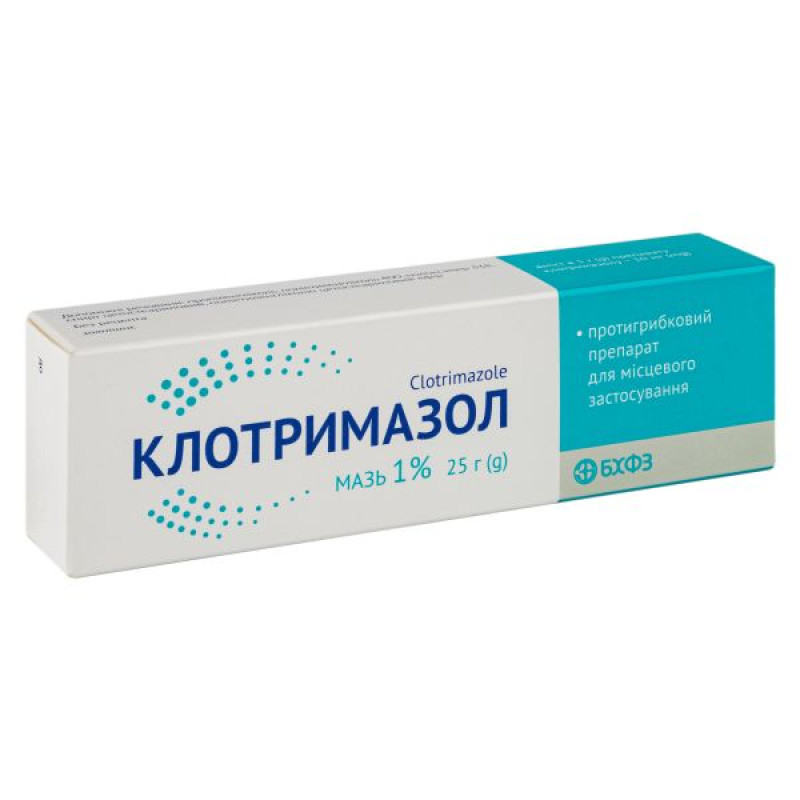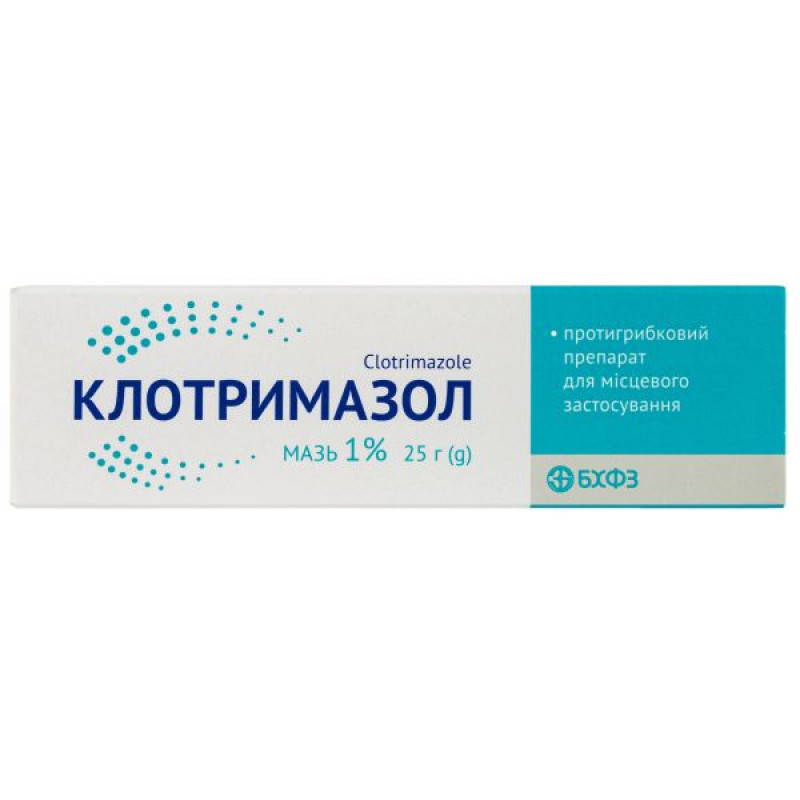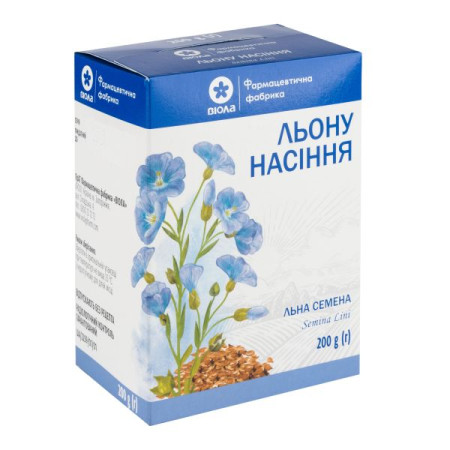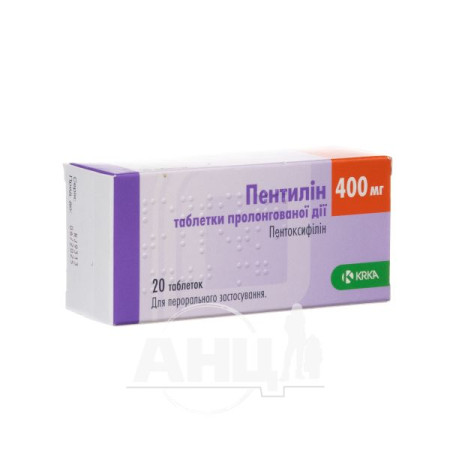Clotrimazole ointment 1% tube 25 g

Instructions Clotrimazole ointment 1% tube 25 g
Composition
active ingredient: clotrimazole;
1 g of ointment contains clotrimazole (calculated on 100% dry matter) 10 mg;
excipients: propylene glycol, polyethylene glycol 400, proxanol 268, cetostearyl alcohol, polyethylene glycol cetostearyl ether.
Dosage form
Ointment.
Main physicochemical properties: white ointment, homogeneous consistency with a faint specific odor.
Pharmacotherapeutic group
Antifungal drugs for topical use. Imidazole and triazole derivatives. Clotrimazole. ATX code D01A C01.
Pharmacological properties
Pharmacodynamics
Antifungal agent from the group of imidazole derivatives for external use.
The mechanism of action of clotrimazole is to block the synthesis of nucleic acids, proteins and ergosterol in fungal cells, which leads to damage to the cell membrane and death of fungal cells. Active against pathogenic dermatophytes (Trichophyton spp., Epidermophyton floccosum, Microsporum spp.); yeast and mold fungi (Candida spp., Torulopsis spp., genus Rhodotorula); pathogens of lichen variegated (Malassezia furfur) and erythrasma (Corynebacterium minutissimum); gram-positive microorganisms (Staphylococcus spp., Streptococcus spp.).
The drug has a fungistatic effect, and against dermatophytes and fungi of the genus Candida - a fungicidal effect.
Pharmacokinetics
The drug has a high penetrating ability. When applied externally, the concentration of the drug in the epidermis is higher than in the dermis and subcutaneous tissue. It is practically not absorbed into the systemic bloodstream.
Indication
Fungal skin infections caused by dermatophytes, yeasts, molds and other pathogens sensitive to clotrimazole.
Skin infections caused by Malassezia furfur (tinker mite) and Corynebacterium minutissimum (erythrasma).
Contraindication
Hypersensitivity to clotrimazole, cetostearyl alcohol or other components of the drug.
Do not use to treat nail or scalp infections.
Interaction with other medicinal products and other types of interactions
The drug may reduce the effect of other topical antifungal drugs, including amphotericin, nystatin, and natamycin.
Dexamethasone in high doses inhibits the antifungal effect of the drug.
Topical application of high concentrations of hydroxybenzoic acid propyl ester enhances the antifungal effect of the drug.
Application features
The product contains cetostearyl alcohol, which may cause local skin reactions (e.g. contact dermatitis) and propylene glycol, which may cause skin irritation. In such cases, it is recommended to use other dosage forms of the product that do not contain these components.
The drug should not be used in ophthalmological practice. Avoid contact with the eyes. If this happens, rinse the eyes with plenty of water. Do not swallow the drug.
During the treatment period, it is not recommended to wear clothing and shoes that do not allow air and moisture to pass through. After applying the drug, the treated surface should not be covered or an occlusive (airtight) bandage should be applied to it.
It is necessary to use the drug for the entire prescribed period of treatment, even if the acute symptoms of the disease have disappeared earlier. Following these recommendations will help prevent the development of reinfection.
If irritation or other signs of hypersensitivity occur, the use of the drug should be discontinued.
Ability to influence reaction speed when driving vehicles or other mechanisms
No effect.
Use during pregnancy or breastfeeding
Clinical studies on the effect of clotrimazole on fertility in women have not been conducted, but animal studies have not shown an effect of clotrimazole on fertility.
There are limited studies of clotrimazole during pregnancy. Animal studies do not indicate direct or indirect harmful effects with respect to reproductive toxicity. As a precautionary measure, it is preferable to avoid the use of clotrimazole during the first trimester of pregnancy.
The drug should not be applied to the mammary glands during breastfeeding.
Breastfeeding should be discontinued during treatment with clotrimazole.
Method of administration and doses
Before applying the ointment, it is necessary to first clean (using soap with a neutral pH value) and thoroughly dry the affected areas of the skin; the feet should be washed with warm water and soap, the ointment should be rubbed in thoroughly, especially between the toes.
The drug should be applied in a thin layer 1-3 times a day to the affected areas of the skin and rubbed in lightly, capturing a small area of skin around the lesion. A single dose based on a surface area the size of the palm is a column of ointment 5 mm long.
The total duration of treatment is:
dermatomycoses – 3-4 weeks; erythrasma – 2-4 weeks; lichen variegated – 1-3 weeks.
Depending on the nature and severity of the disease, the doctor may prescribe an individual dosage regimen and method of administration of the drug, as well as the duration of treatment.
For reliable removal of the pathogen and depending on the symptoms, treatment should be continued for approximately 2 weeks after the disappearance of subjective symptoms.
The patient should consult a doctor for repeated microbiological examination and correction of therapy in the absence of clinical improvement 4 weeks after the start of treatment.
Children
There is no experience with the use of the drug in children.
Overdose
If the product is used as described in the section "Method of administration and dosage", only a very small amount of the active substance (clotrimazole) will be absorbed by the body. Therefore, there is no likelihood that systemic effects (effects on other organs) may occur.
Accidental ingestion of a large amount of the drug may cause dizziness, nausea, vomiting, abdominal pain, and liver dysfunction.
Treatment: discontinue use of the drug, rinse the stomach, and if necessary, conduct symptomatic therapy.
Adverse reactions
Immune system: allergic reactions, including anaphylactic/anaphylactoid reactions (anaphylactic shock, angioedema, syncope, hypotension, dyspnoea and urticaria).
Skin and subcutaneous tissue: redness (erythema), blistering, peeling, burning/heat sensation, tingling, local swelling, itching, rash, general irritation, pain/discomfort, dryness, allergic contact dermatitis.
In case of hypersensitivity to cetostearyl alcohol and propylene glycol, allergic skin reactions may occur.
The appearance of these symptoms requires discontinuation of treatment with the drug.
Expiration date
2 years.
Storage conditions
In the original packaging at a temperature not exceeding 25 ºС, do not freeze.
Keep out of reach of children.
Packaging
25 g in a tube and a pack.
Vacation category
Without a prescription.
Producer
Public Joint Stock Company "Research and Production Center "Borshchagov Chemical and Pharmaceutical Plant".
Location of the manufacturer and its business address
Ukraine, 03134, Kyiv, Myru St., 17.
There are no reviews for this product.
There are no reviews for this product, be the first to leave your review.
No questions about this product, be the first and ask your question.








